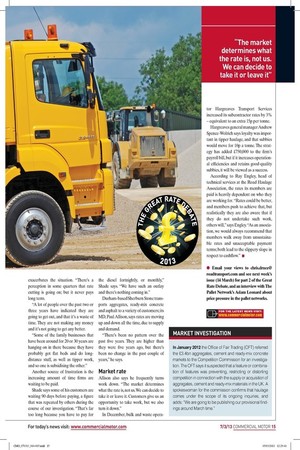The gritty game Rates for operators in the building materials
Page 10

Page 11

If you've noticed an error in this article please click here to report it so we can fix it.
sector are low, while spiralling fuel prices are forcing many to make tough decisions, as part one of our Great Rate Debate series reveals Words: Chris Tindall HAULIERS WORKING in the building materials and aggregates sector say rising fuel prices have not been reflected in their rates, piling pressure on an already-competitive market.
The situation has led to one operator saying he is in a trap where barrel bottom rates make it unprofitable to take work on, but unaffordable to turn down.
Howard Shade, at Howard Shade Haulage Contractor, in Bedale, North Yorkshire, sums up the dilemma of operating vehicles costing £100,000: "Between December and January, I did more or less nothing. I could have done work, but I wouldn't go out for the rate they would pay; it wasn't justified.
"If you're running a wagon, you need to be making £400 a day minimum to justify running it. But if you have 80 tonnes and it's £4.20 a tonne, then that's just £336. I have been in a bit of a predicament these past two months."
Dewi Jones, at OJ Jones & Son in north Wales, agrees that profit margins are dwindling. He worries that with Euro-6 looming, the cost of investing in vehicles will make operating in the sector impossible. "There are times when everything has to be replaced, and there are times when you think hard about what you are doing. People are getting to the point where they're thinking it's better to park up their vehicles than keep on going," he says.
His recent decision to apply to run an authorised testing facility was based on a strategy of diversifying to enable him to boost profit. "We're concentrating a little bit more on the garage business because haulage is becoming a problem for a lot of companies," he says.
Although the companies we spoke to say rates were either too low or had failed to catch up with the cost of the work over the past five years, they also say the current price of fuel and the inability to pass this on is damaging their bottom line the most.
"Month to month, depending on the product you are carrying, it's 5ppl or 6ppl more; but the rates don't reflect that," says Nicky Miles, director at Foley & Miles in Grays.
"The large companies we work for have a fuel escalator, but the majority of the companies we work for don't. We try to increase rates annually to reflect the fluctuating price [of diesel] but it's difficult. It's still a competitive market and customers will go somewhere else for £20," he adds.
For Foley & Miles, which is based in Essex and close to the capital, there are other financial considerations too, such as the London Low Emission Zone. "We run 46 vehicles. We couldn't choose between them, because that would be a logistical headache, so every single one had to be compliant."
Depressed market Richard Bird, executive officer at the British Aggregates Association, says the market is down 30% to 40%, which exacerbates the situation. "There's a perception in some quarters that rate cutting is going on; but it never pays long term.
"A lot of people over the past two or three years have indicated they are going to get out, and that it's a waste of time. They are not making any money and it's not going to get any better.
"Some of the family businesses that have been around for 20 or 30 years are hanging on in there because they have probably got flat beds and do longdistance stuff, as well as tipper work, and so one is subsidising the other."
Another source of frustration is the increasing amount of time firms are waiting to be paid.
Shade says some of his customers are waiting 90 days before paying, a figure that was repeated by others during the course of our investigation. "That's far too long because you have to pay for the diesel fortnightly, or monthly," Shade says. "We have such an outlay and there's nothing coming in."
Durham-based Sherburn Stone transports aggregates, ready-mix concrete and asphalt to a variety of customers; its MID, Paul Allison, says rates are moving up and down all the time, due to supply and demand.
"There's been no pattern over the past five years. They are higher than they were five years ago, but there's been no change in the past couple of years," he says.
Market rate Allison also says he frequently turns work down. "The market determines what the rate is, not us. We can decide to take it or leave it. Customers give us an opportunity to take work, but we also turn it down."
In December, bulk and waste opera tor Hargreaves Transport Services increased its subcontractor rates by 3% — equivalent to an extra 15p per tonne.
Hargreaves general manager Andrew Spence-Wolrich says loyalty was important in tipper haulage, and that subbies would move for 10p a tonne. The strategy has added £750,000 to the firm's payroll bill, but if it increases operational efficiencies and retains good-quality subbies, it will be viewed as a success.
According to Ray Engley, head of technical services at the Road Haulage Association, the rates its members are paid is heavily dependent on who they are working for. "Rates could be better, and members push to achieve that, but realistically they are also aware that if they do not undertake such work, others will," says Engley. "As an association, we would always recommend that members walk away from unsustainable rates and unacceptable payment terms; both lead to the slippery slope in respect to cashflow." • • Email your views to chris.druce@ roadtransport.com and see next week's issue (14 March) for part 2 of the Great Rate Debate, and an interview with The Pallet Network's Adam Leonard about price pressure in the pallet networks.
In January 2012 the Office of Fair Trading (OFT) referred the £3.4bn aggregates, cement and ready-mix concrete markets to the Competition Commission for an investigation. The OFT says it suspected that a feature or combination of features was preventing, restricting or distorting competition in connection with the supply or acquisition of aggregates, cement and ready-mix materials in the UK. A spokeswoman for the commission confirms that haulage comes under the scope of its ongoing inquiries, and adds: "We are going to be publishing our provisional findings around March time."







































